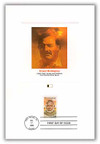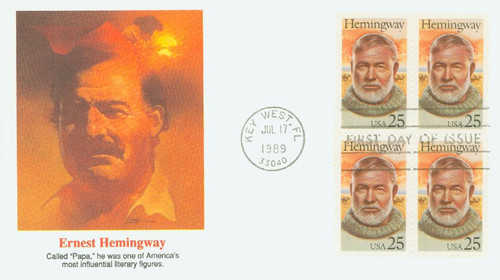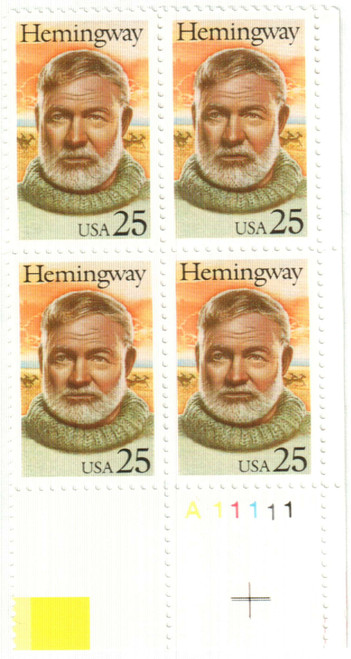
# 55759 - 1989 Ernest Hemingway Proofcard
Â
Ernest Hemingway Wounded In WWIÂ
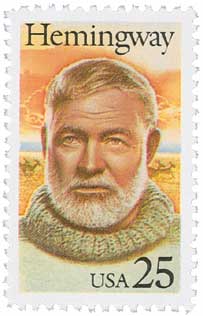
On July 8, 1918, author Ernest Hemingway was wounded while serving with the Red Cross on the Italian Front in World War I.
Born in Oak Park, Illinois, Hemingway was working as a reporter for the Kansas City Star when the war began in 1914.  Before America entered the war he volunteered to join the Red Cross in France. By early July 1918, he found himself on the Italian front.
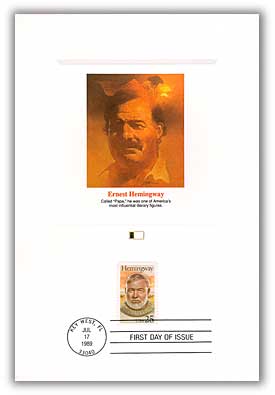
On the night of July 8, 1918, Hemingway, an ambulance driver for the Red Cross, was handing out chocolate to Allied soldiers. Suddenly an Austrian mortar shell hit their location, knocking Hemingway unconscious. The explosion buried him in the dirt and pieces of shell were embedded in his right foot, knee, thighs, scalp, and hand. In describing the incident in a letter home he recalled, “Then there was a flash, as when a blast-furnace door is swung open, and a roar that started white and went red.â€
The blast also hit three Italian soldiers. Two died shortly after the blast. And when Hemingway regained consciousness he carried the third injured soldiers to a nearby first aid dugout. He was further injured by machine gun fire on the way. Hemingway later forgot how he even got there or that he’d carried a soldier there, but eventually remembered. In a letter home to his family he said, “Everything is fine and I am very comfortable and one of the best surgeons in Milan is looking after my wounds.†The Italians later awarded him a medal of valor, the Croce de Guerra, for his bravery in this instance.
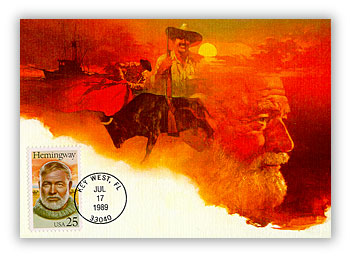
Discussing the effect of the incident, Hemingway claimed, “When you go to war as a boy you have a great illusion of immortality. Other people get killed; not you… Then when you are badly wounded the first time you lose that illusion and you know it can happen to you. After being severely wounded two weeks before my nineteenth birthday I had a bad time until I figured out that nothing could happen to me that had not happened to all men before me. Whatever I had to do men had always done. If they had done it then I could do it too and the best thing was not to worry about it.â€
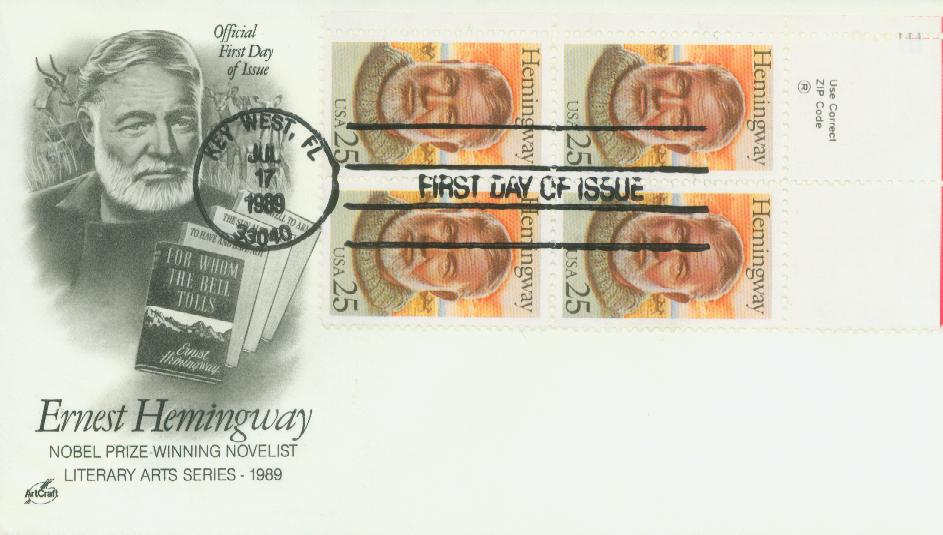
Hemingway would spend the next six months in a Milan hospital recuperating. It was there he met and fell in love with a Red Cross nurse, Agnes von Kurowsky. His wartime experiences provided inspiration for several future stories, though this particular incident was influential in his popular novel, A Farewell to Arms.
Â
Ernest Hemingway Wounded In WWIÂ

On July 8, 1918, author Ernest Hemingway was wounded while serving with the Red Cross on the Italian Front in World War I.
Born in Oak Park, Illinois, Hemingway was working as a reporter for the Kansas City Star when the war began in 1914.  Before America entered the war he volunteered to join the Red Cross in France. By early July 1918, he found himself on the Italian front.

On the night of July 8, 1918, Hemingway, an ambulance driver for the Red Cross, was handing out chocolate to Allied soldiers. Suddenly an Austrian mortar shell hit their location, knocking Hemingway unconscious. The explosion buried him in the dirt and pieces of shell were embedded in his right foot, knee, thighs, scalp, and hand. In describing the incident in a letter home he recalled, “Then there was a flash, as when a blast-furnace door is swung open, and a roar that started white and went red.â€
The blast also hit three Italian soldiers. Two died shortly after the blast. And when Hemingway regained consciousness he carried the third injured soldiers to a nearby first aid dugout. He was further injured by machine gun fire on the way. Hemingway later forgot how he even got there or that he’d carried a soldier there, but eventually remembered. In a letter home to his family he said, “Everything is fine and I am very comfortable and one of the best surgeons in Milan is looking after my wounds.†The Italians later awarded him a medal of valor, the Croce de Guerra, for his bravery in this instance.

Discussing the effect of the incident, Hemingway claimed, “When you go to war as a boy you have a great illusion of immortality. Other people get killed; not you… Then when you are badly wounded the first time you lose that illusion and you know it can happen to you. After being severely wounded two weeks before my nineteenth birthday I had a bad time until I figured out that nothing could happen to me that had not happened to all men before me. Whatever I had to do men had always done. If they had done it then I could do it too and the best thing was not to worry about it.â€

Hemingway would spend the next six months in a Milan hospital recuperating. It was there he met and fell in love with a Red Cross nurse, Agnes von Kurowsky. His wartime experiences provided inspiration for several future stories, though this particular incident was influential in his popular novel, A Farewell to Arms.



